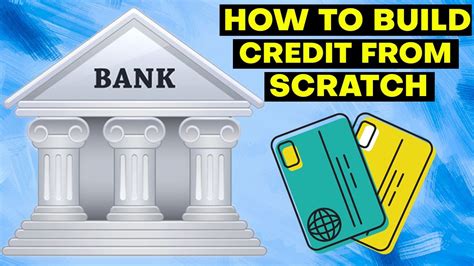How to Build Your Credit from Scratch

Building your credit from scratch may seem like a daunting task, but with the right approach, it’s entirely achievable. A good credit score opens the door to better interest rates on loans, easier access to housing, and even more favorable job opportunities in certain industries. Whether you’re a recent graduate, new to the country, or someone who’s never had credit before, starting with a clean slate is possible with patience, strategy, and persistence. Here's a step-by-step guide to help you build your credit from scratch.
Understand How Credit Works
Before you start building your credit, it’s crucial to understand how credit scores work. In the U.S., credit scores typically range from 300 to 850, with higher scores reflecting better creditworthiness. The most commonly used scoring model, FICO, is calculated based on the following factors:
- Payment History (35%): Your record of on-time payments.
- Credit Utilization (30%): The ratio of your credit card balances to your credit limits.
- Length of Credit History (15%): How long you’ve been using credit.
- Credit Mix (10%): The variety of credit types you have (credit cards, loans, etc.).
- New Credit (10%): The number of recent credit inquiries or accounts opened.
A good understanding of these factors will guide you as you take steps to build your credit responsibly.
Start with a Secured Credit Card
For most people just starting out, a secured credit card is the easiest way to get your foot in the door. A secured card requires a cash deposit, which serves as collateral and determines your credit limit. For example, if you deposit $500, your credit limit will be $500.
- Use the card regularly: Make small purchases, and pay them off in full each month. This shows creditors that you can manage credit responsibly.
- Avoid high utilization: Keep your credit utilization rate (the ratio of your balance to your credit limit) below 30% to have a positive impact on your score.
Secured cards are available from many major credit card issuers, and some even offer an automatic upgrade to an unsecured card after a period of responsible use, which helps boost your credit profile over time.
Consider Becoming an Authorized User
If you have a family member or friend with a good credit history, ask if they’ll add you as an authorized user on one of their existing credit cards. This doesn’t require you to make any purchases or have any access to the card itself, but it allows the account’s positive history to be added to your credit report.
Being an authorized user can be a great way to start building your credit, as long as the primary account holder maintains good credit habits, such as making on-time payments and keeping credit utilization low.
Open a Credit Builder Loan
Some financial institutions, especially credit unions, offer credit builder loans, which are designed specifically for individuals with little to no credit history. These loans work by holding your borrowed funds in a savings account or certificate of deposit (CD) until the loan is repaid in full. The lender reports your on-time payments to the credit bureaus, which helps build your credit.
Since these loans typically require a small amount of collateral, they are often accessible to people who don’t have an established credit history.
Use a Co-Signer for an Unsecured Loan or Credit Card
If you’re able to find a co-signer—someone with good credit who is willing to assume responsibility for your credit usage—you may be able to get approved for an unsecured credit card or a personal loan. This option is a good way to jump-start your credit history, but it’s important to be responsible, as missed payments can hurt both your credit and that of your co-signer.
Pay Bills on Time
While bills like utilities and rent don’t typically show up on your credit report, paying them on time can still help you build credit if they’re reported. Some services, such as Experian Boost, allow you to add utility and phone payments to your credit report. Additionally, if you’re paying rent, consider using services like RentTrack or Rental Kharma to have your rent payments reported to the credit bureaus.
Timely payments—whether for credit cards, loans, or bills—are a major factor in building a good credit score. Even if you start small, keeping a history of on-time payments is essential to long-term credit health.
Monitor Your Credit Regularly
Once you start building your credit, it’s important to monitor your progress. You can request a free credit report from each of the three major credit bureaus—Equifax, Experian, and TransUnion—once per year through AnnualCreditReport.com. Reviewing your credit reports helps you identify any errors or signs of identity theft.
Additionally, many credit card issuers and financial institutions offer free credit score tracking as a part of their services, which can help you track your score and make adjustments to improve it.
Be Patient and Persistent
Building credit from scratch doesn’t happen overnight. It may take several months before you see significant changes in your credit score. But as long as you continue to make on-time payments, keep your credit utilization low, and use credit responsibly, your score will steadily improve.
If you’re serious about building your credit, stick with it. Even small, consistent efforts can lead to significant progress over time. It’s also important to avoid common mistakes that can damage your credit, such as missing payments, racking up high balances, or applying for too much new credit at once.
Final Thoughts
Building credit from scratch can feel overwhelming, but it’s an essential step toward securing your financial future. By starting with small, manageable steps like getting a secured credit card, becoming an authorized user, or opening a credit builder loan, you can gradually build a strong credit history. Be patient, stay disciplined, and always pay your bills on time—before you know it, you’ll have established a solid credit profile that will open up new financial opportunities.